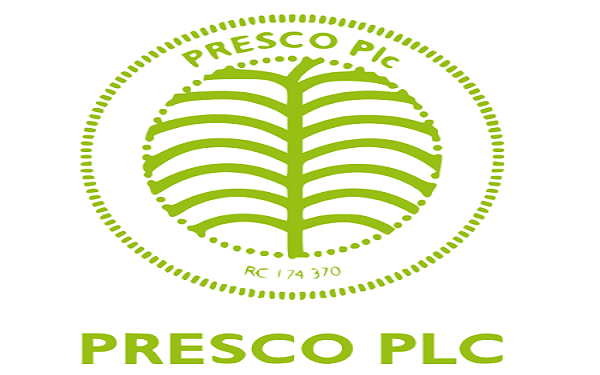Rising Input Cost Keeps Presco’s profit Flat At N5.9b In Q1
Presco Plc, the oil palm and rubber producer, faced mounting pressure from input costs in the first quarter, which consumed much of the gain in sales and left profit flat at less than N5.9 billion for the quarter. The year seems to have begun on the contrary side for the company in contrast to the exceptional earnings growth achieved last year.
The company’s interim report for the first quarter ended March 2022 shows that cost of sales rose by N2.6 billion or 80 per cent year-on-year to about N5.8 billion at the end of the quarter. Cost of sales has been on the rise since last year when it grew by 105 per cent to N16 billion per full year.
The increase in the cost of sales in the first quarter is three times an increase of 27 per cent in turnover, which amounted to N19.6 billion for the period. It claimed 61 per cent of the increase of N4.2 billion in sales revenue, jerking up the cost margin from 20.8 per cent in the same period last year to over 29 per cent at the end of March 2022.
The cost increase hindered the improvement in gross profit, which grew by 13 per cent to N13.8 billion in the first quarter. This is a sharp slowdown from an outstanding growth of 94 per cent in gross profit to over N31 billion in 2021.
Gross profit margin, therefore, went down from 79 per cent to 71 per cent over the review period. That remains a top performance record in the highly inflationary environment of the Nigerian economy.
Two other major cost areas of the company failed to afford any cost savings to counter the encroachment of cost of sales. One of the two major costs is administrative expenses, which grew at an equal pace with sales revenue to close at N3.6 billion at the end of the period.
In the absence of any cost-saving from operating expenses, operating profit closed at N10 billion in the first quarter, a moderated increase of 9 per cent or just one-third of the increase in turnover. Operating profit had grown by 131 per cent to over N24 billion in the prior fiscal year.
The other major cost element of the company is finance expenses, which more than doubled at 114 per cent to close at about N1.5 billion in the first quarter. This is a round-about shift from last year’s position when the cost of finance led to a decrease in costs at a drop of 68 per cent.
The increase in finance expenses claimed all the remaining gain in sales revenue, meaning that no part of the N4.2 billion increase in turnover reached the bottom line. The resulting flat profit position for the company in the first quarter detracts sharply from a three-fold jump in profit the company recorded in the preceding financial year to close at N19 billion.
The company carries interest-bearing debts of about N52 billion on the balance sheet as of the end of the first quarter, which is a reduction from the closing figure of over N56 billion in 2021.
Presco may be cooling off this year after it raced through the earnings track in 2021 and finished with the strongest profit improvement in many years. While it couldn’t grow profit in the first quarter, its management was able to shield profit against rapidly rising costs at least.
The company however lost profit margin from 37.8 per cent in the same period last year to 30 per cent in the first quarter of the current financial year. This reflects the inability to convert the increase in sales revenue into profit. It closed last year with a profit margin of 40 per cent.
The company closed the first quarter of operations with earnings per share of N5.89 compared to N5.82 per share in the same quarter in 2021. It paid a total cash dividend of N7.60 per share for the 2021 operations.



Comments are closed.